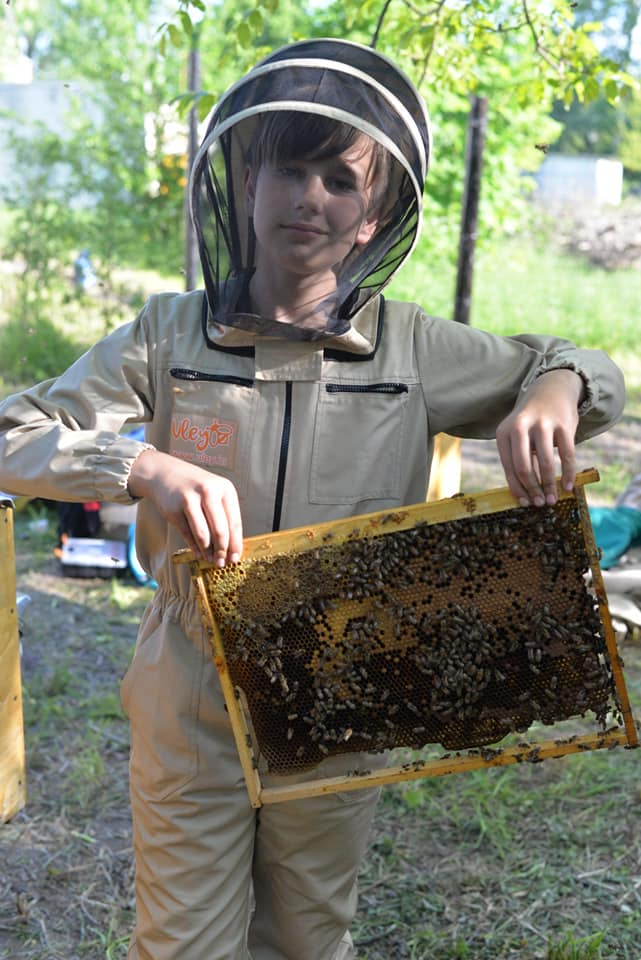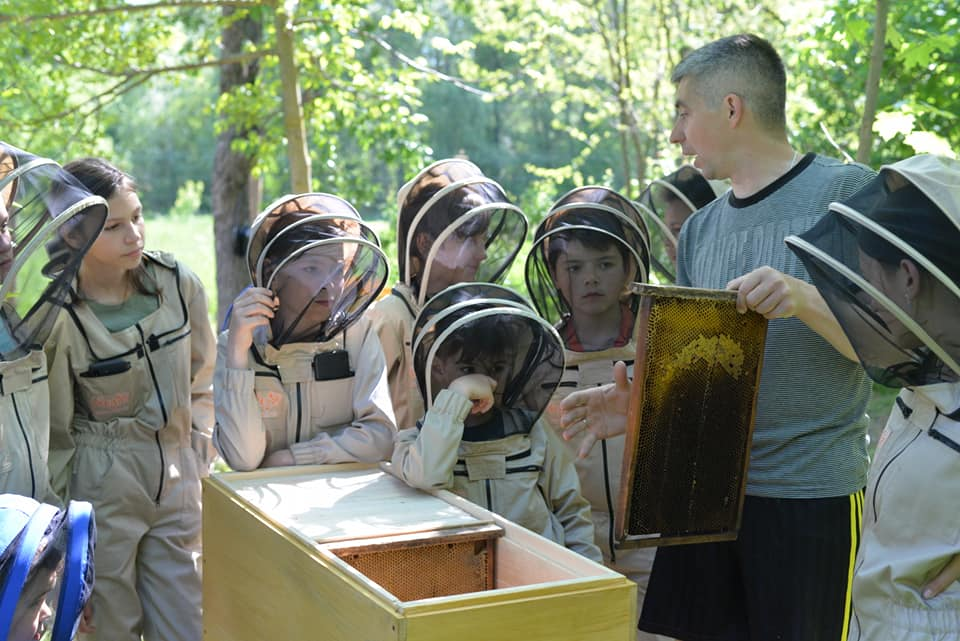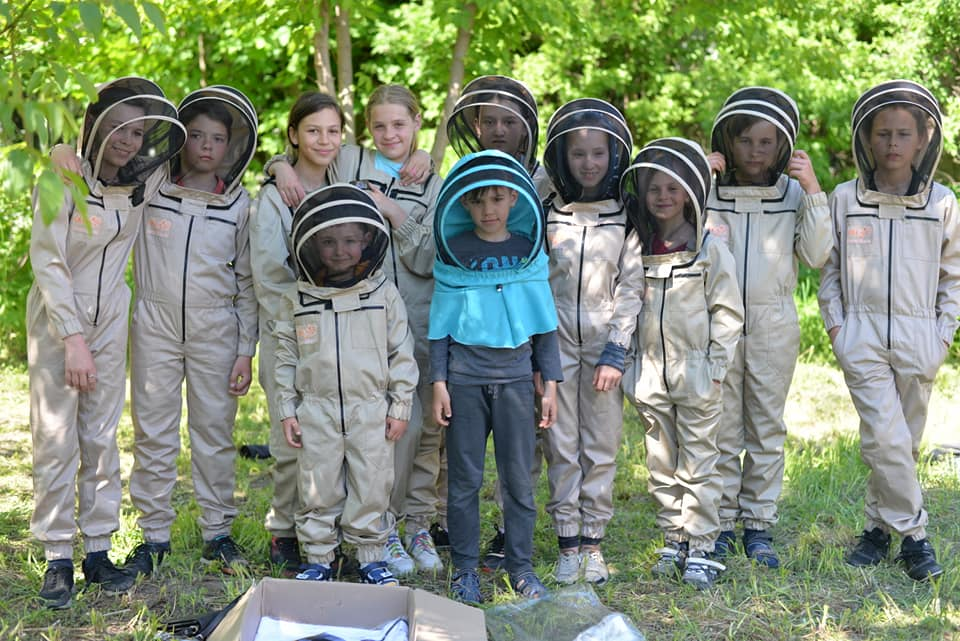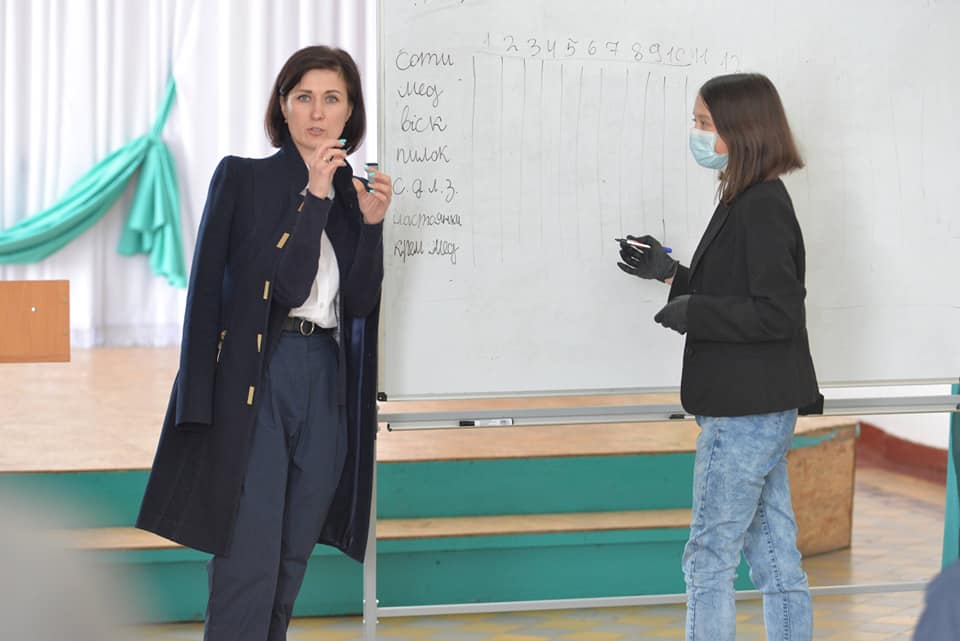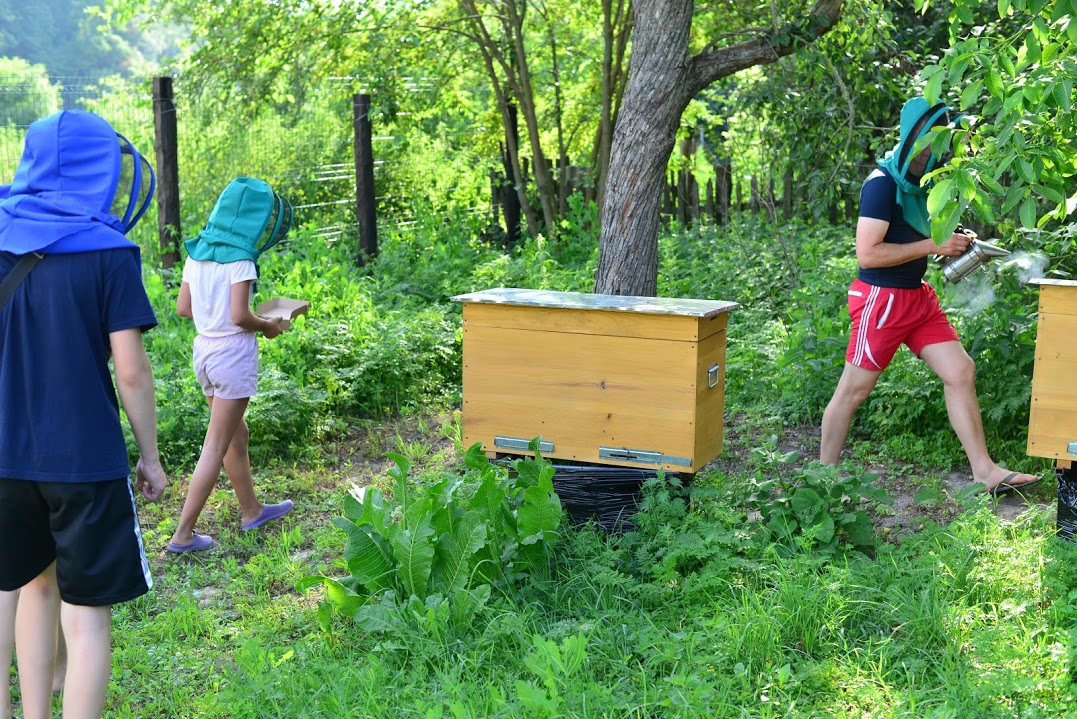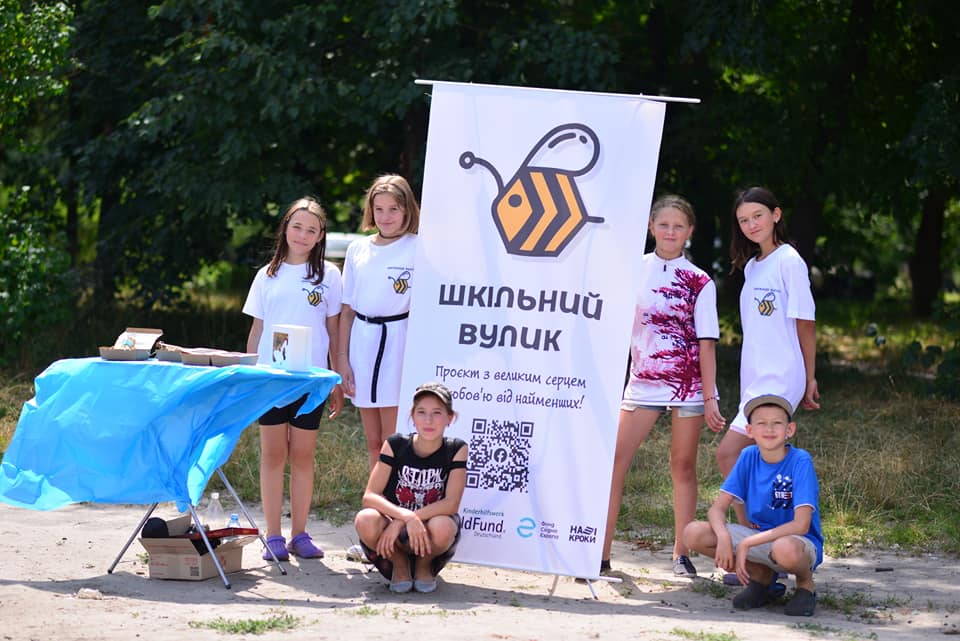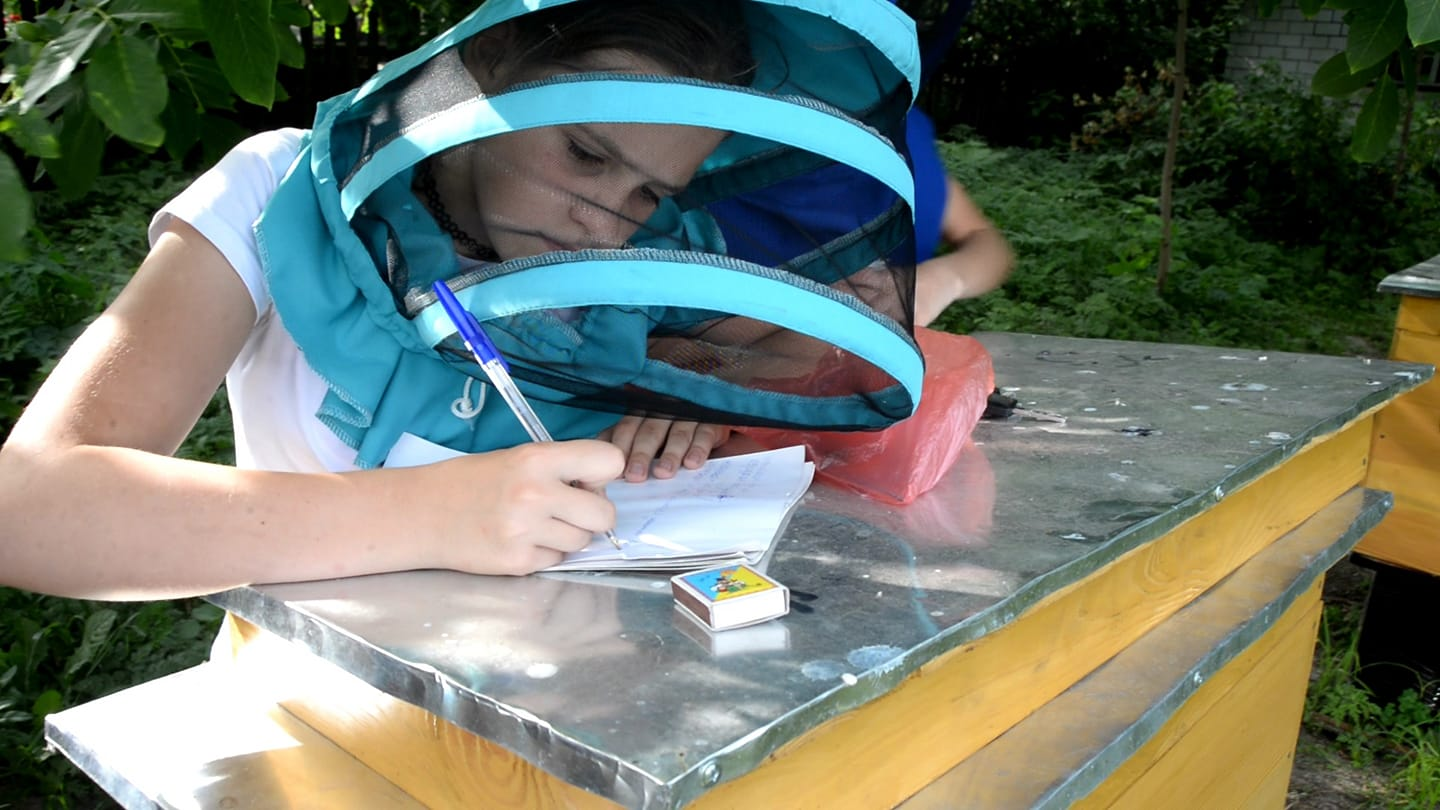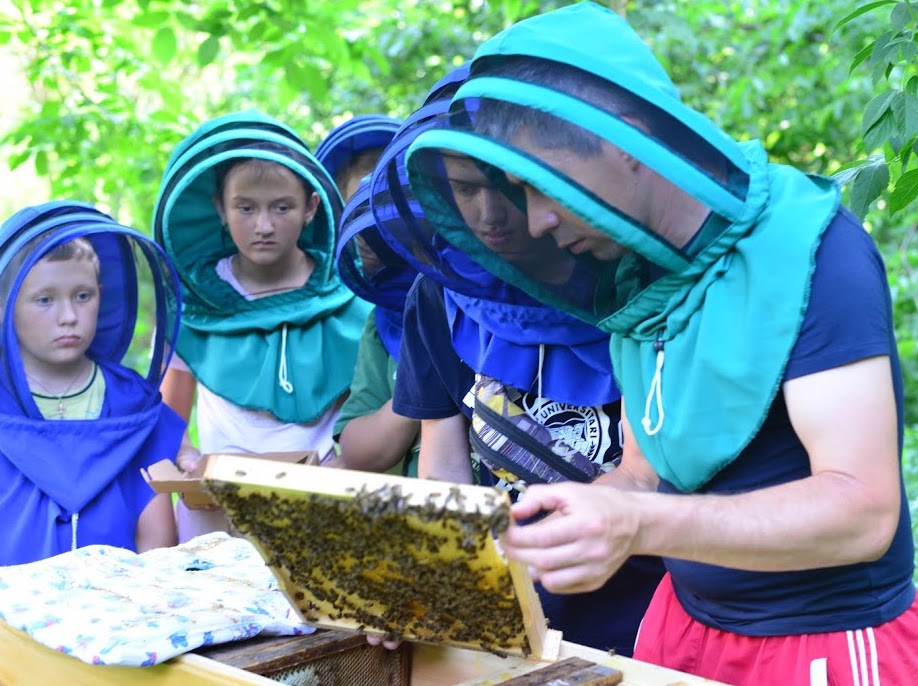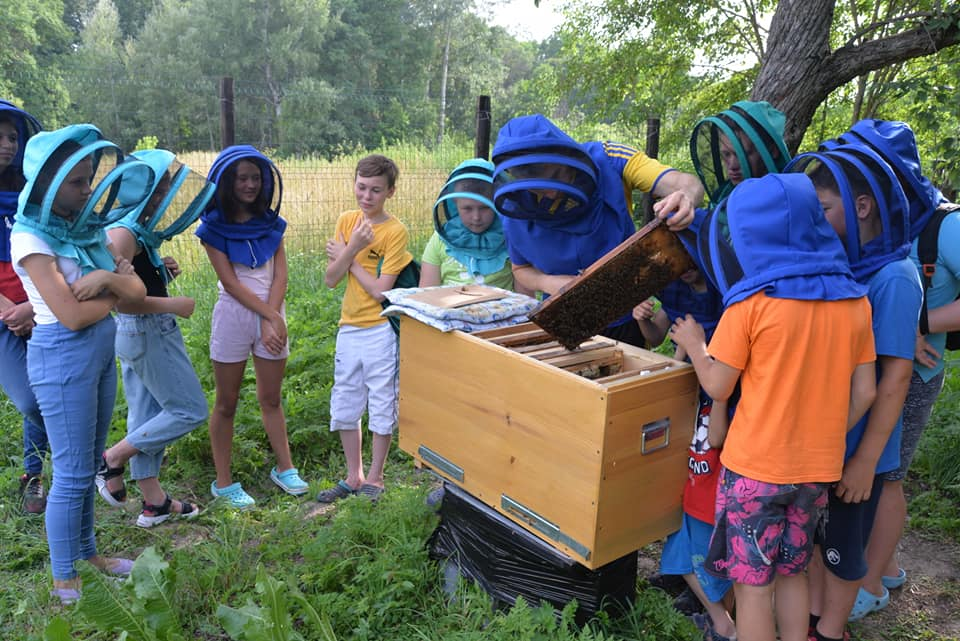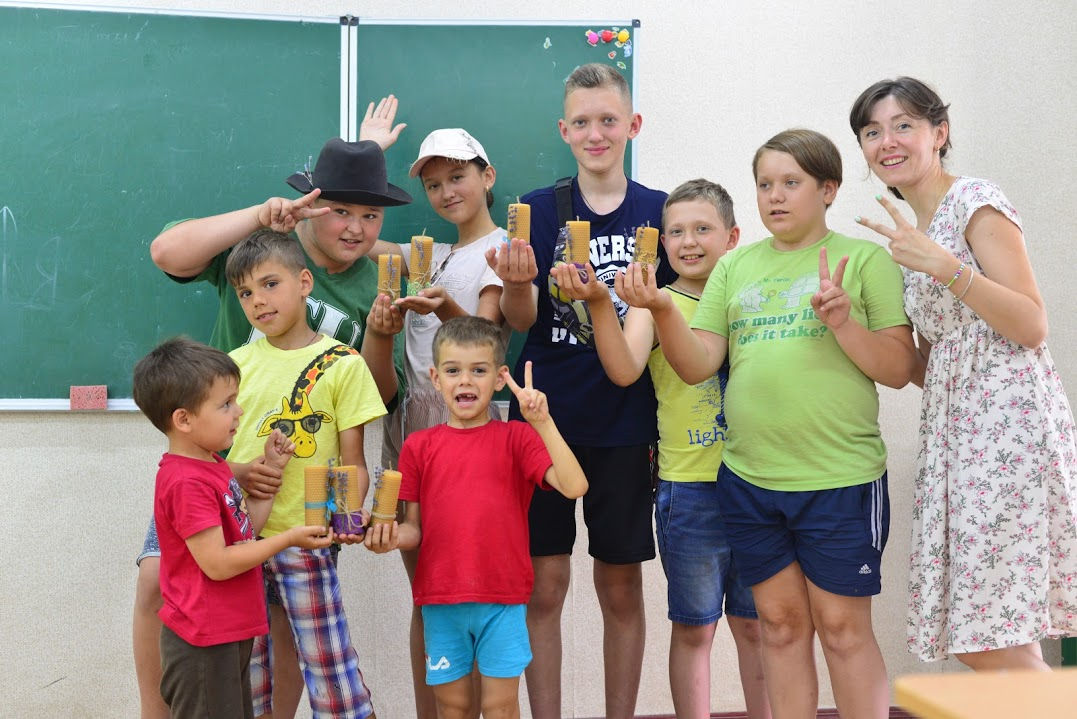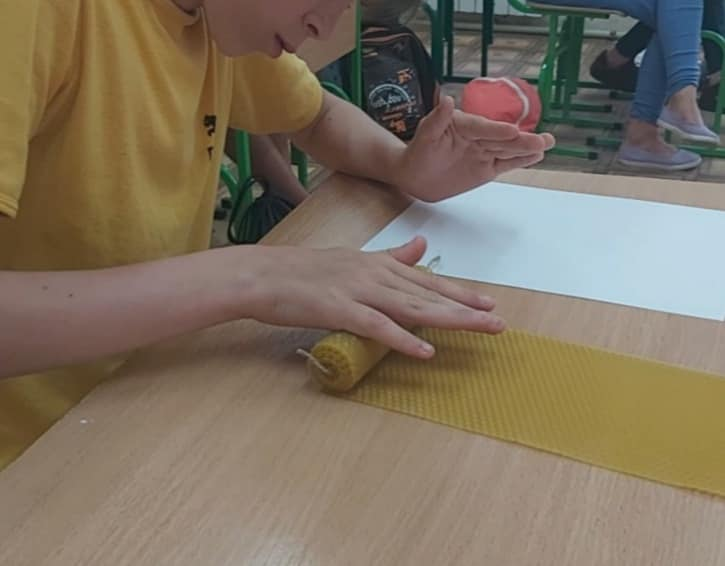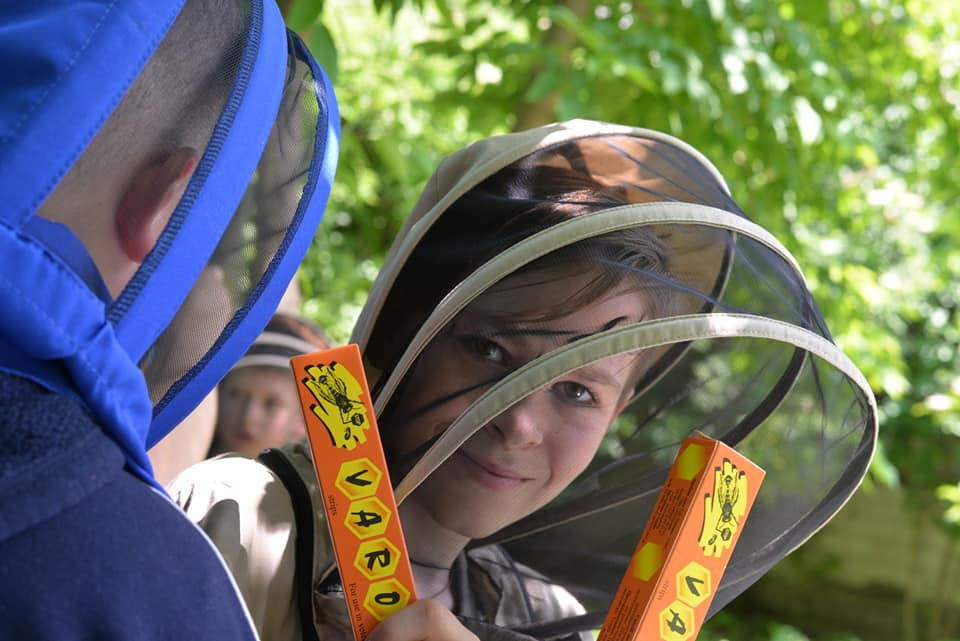Why school kids need apiaries, or how Ukrainian bees teach social entrepreneurship
One school in Ukraine's Kyiv region launched a unique social business with students and bees. The children learn to make honey, but also learn to work in a team, help others, be creative and responsible.

In the charming village of Zavorychi, one schoolyard buzzes with activity — even during summer break. And quite literally so. This spring, local schoolchildren launched School Beehive, an innovative social enterprise — an apiary with six beehives.
In collaboration with the Ukrainian nonprofit Our Steps, students are building a school apiary as part of the project "Establishing Social School Enterprises in Rural Areas and Small Towns of Ukraine to Encourage Young People to Social Entrepreneurship." The initiative is implemented by the Eastern Europe Foundation and ChildFund Deutschland, with funding from Germany's Federal Ministry for Economic Cooperation and Development.
Think beekeeping isn't for kids? These young entrepreneurs have proven otherwise in just a few short months.
Why do schoolchildren need an apiary?
According to Natalia Roslyk, co-founder of Our Steps, the idea of creating a school apiary had been brewing for a long time. The driving force behind the initiative was Maksym Kulida — one of the project's current curators and the leader of a school club in Zavorychi. He proposed the idea of developing an apiary at the school and teaching children the art of beekeeping — a challenging yet fascinating craft. While everyone recognized that combining a school and bees was unconventional, the idea quickly won the support of both the school and the local community.
At first, the nonprofit's team explored other possibilities. "When we were drafting the grant application for a social school enterprise, we also considered ideas like growing eco-friendly greens or upcycling second-hand clothing," says Roslyk. "While both were promising, we ultimately chose beekeeping — and time has proven us right. The growing enthusiasm from both children and adults has been incredible. Now, we're planning to scale up and create a nationwide network of school apiaries!"
Bukovynian bees
For a long time, the idea of an apiary remained just that — an idea. The community lacked the necessary funds, and support from sponsors and philanthropists wasn't enough to bring such a social initiative to life. That's why volunteers decided to apply for a grant. The NGO Our Steps admits that the team had little experience with grant writing, but even then, they saw the potential — the children would love it.
The breakthrough came when the School Beehive initiative secured UAH 75,000 through the project "Establishing Social School Enterprises in Rural Areas and Small Towns of Ukraine to Encourage Young People to Social Entrepreneurship." This funding became the foundation for turning Zavorychi residents' bold vision into reality.
During the project's implementation, over UAH 40,000 was spent on equipment and tools essential for the enterprise — hives, frames, foundation boards, beekeeper suits, protective masks, glass containers, buckets, smokers, filters, and more. The bee colonies, a Carpathian breed renowned for honey production, were brought to the Kyiv region all the way from Bukovyna. Recognized as one of the best in Ukraine, this breed is well-suited for regions with diverse herbaceous honey plants.
Beyond the grant funding, Our Steps members provided extra support, strengthening the project's logistics and helping to make the enterprise more capable and competitive.
Then came the most exciting part. Purchasing equipment and bees was just the beginning — the real goal was to get children actively involved, not just observing from the sidelines. From day one, young beekeepers took on hands-on tasks, including landscaping, fencing, preparing and arranging hives, and carefully relocating bees from transport containers to their new homes — all while keeping up with their school studies.
To deepen their knowledge, students attended specialized master classes on beekeeping safety, hive management, and even the business side of honey production. A diverse group of experts — local activists, former deputies, and renowned specialists — shared their expertise.
For instance, Petro Diachenko, longtime personal beekeeper to former Ukrainian President Viktor Yushchenko, introduced the children to the fundamentals of beekeeping. Alina Bocharnikova, a leading expert in the field, explained the basics of social entrepreneurship. Pavlo Babenko, Deputy Chairperson of the Federation of Employers in the Field of Tourism of Ukraine and a specialist in market research and marketing strategies, provided insights into branding and sales. Meanwhile, Ruslana Balakir, former head of the budget commission of the Kalyta village council, taught the young entrepreneurs financial literacy — helping them understand costs, potential income, and how to keep the business profitable.
The engaging presentations, accessible explanations, and open discussions left the students even more inspired and motivated to develop their common beekeeping venture.
Finding a way out of the "virtual bubble"
At first, Svitlana Butrym, the mother of one of the project participants, was skeptical. "Honestly, I thought my children wouldn't be interested. My youngest son refused to attend the first lectures, and the eldest only agreed reluctantly," she recalls. But everything changed after the hands-on sessions. "Andrii got hooked. They started talking about the school apiary at home, watching beekeeping videos on YouTube. Now, my youngest son runs there eagerly. My husband even bought them materials to build hives, and friends have promised to give them a bee colony. The boys are now saving up for equipment and already planning their own home apiary."
Initially, some parents had concerns about safety. But as they saw their children's enthusiasm grow, their worries faded. Instead, they became active supporters — spreading the word about the school enterprise and its honey products. To ensure students' safety, the organizers provided insurance for the duration of the project and stocked essential medical supplies for bee stings.
The school administration also played a crucial role in fostering parental trust. They supported the initiative from the outset and continue to assist in every way possible.
Currently, 15 students from the Zavorychi school, aged 7 to 14, are involved in the project. Each has a specific role in the school enterprise. Seventh-grader Anastasia Boboshko serves as the enterprise's director, while other students take charge of marketing, supply management, public relations, finance, and logistics. Though the children are eager to learn, managing all these responsibilities is no easy task. That's where curators Maksym Kulida and Pavlo Dubovyi step in.
Kulida, a beekeeper, railway worker, village council deputy, and head of the school group, oversees the educational side — teaching the students beekeeping fundamentals and guiding their work in the apiary. Dubovyi, an active participant in the Kalyta community's public life, handles organizational tasks, liaises with the grantor, and promotes the social enterprise. Meanwhile, activists from Our Steps — as passionate about the project as the children themselves — continue to provide invaluable support.
Project coordinator Pavlo Dubovyi believes school social enterprises can help children break free from the "virtual bubble" that so many get trapped in. "Over the past twenty years, the time children spend in front of screens — phones, TVs, computers — has skyrocketed. They're often called the 'digital generation.' But that doesn't mean they can't experience and enjoy the real world."
According to Dubovyi, nothing in the virtual world compares to the hands-on adventure of beekeeping. "No video game can replace the thrill of setting up swarm traps, gathering winter food supplies for the bees, or inspecting hives every week. You need to suit up, move carefully, and, most importantly, work as a team. That builds skills no video game, not even FIFA or Minecraft, can teach. And like in every game, every lesson at School Beehive is a new level, a new challenge, and a new life experience. And without those, there are no great VICTORIES — whether in games or in life."
Cold spring and other challenges
Of course, the project wasn't without its difficulties. Two major obstacles stood out: the weather and the peculiarities of Ukraine's beekeeping market.
"This spring was unusually cold," says Natalia Roslyk. "As a result, the bee colonies arrived much later than expected." On top of that, the bees were still young and focused more on building their strength — consuming more honey for themselves rather than storing it in honeycombs. While this is a temporary phase as the colonies grow, it's an important factor to consider for future apiary projects.
Another challenge emerged when setting up the material and technical base of the school enterprise. The grant required all necessary equipment to be purchased officially — with contracts, invoices, and receipts. However, a significant portion of Ukraine's beekeeping market operates in the shadow sector, where transactions are often conducted off the books without formal agreements or official payments. This initially created obstacles, but in the long run, it provided valuable insight into the market's realities and, most importantly, helped the team identify reliable, legally compliant suppliers.
How schoolchildren protect bees
The project participants affectionately call their tiny wards "buzzers." But for the students of Zavorychi, beekeeping is much more than simply observing hives and making occasional visits to the apiary. It's real work, an exciting quest full of challenges, and a meaningful way to contribute to the environment — all while nurturing creativity.
Even Hollywood celebrities have raised awareness about the global decline of bee populations. Now, thanks to the School Beehive project, Zavorychi's children are actively supporting these vital pollinators. While it's difficult to influence this global issue on a school level, the young beekeepers refuse to ignore the problem. Soon, School Beehive will release an educational leaflet highlighting the dangers of chemical pesticides and promoting responsible field treatment. "If it helps save even one bee colony, it's already a success," said the project's organizers.
Valeria Sydoruk, a student and project participant, shares her excitement: "What I love most about the apiary is our team. It's friendly and hardworking. And through bees, we see what real teamwork looks like. Plus, we're gaining experience in so many areas — from science to economics and business planning. I believe our School Beehive will keep growing, attracting even more children not just from our village or community but from across Ukraine."
School of Entrepreneurship
When the students realized this year's honey harvest would be smaller than expected, they quickly adapted. After discussing options, they decided to diversify their product line instead of waiting for the next honey extraction. As a result, they produced two batches of wax candles infused with propolis, which immediately caught the interest of buyers. By early July, candle sales had already generated about UAH 2,000 in revenue.
But the students' ambitions go far beyond candles. They're exploring ideas for honey-based lemonade — perfect for Ukraine's scorching summers — along with honey candies, marmalade, and pastilles. For their honey, they've already designed branded packaging. While their primary market is the local community, they recognize the power of the internet to expand their reach beyond the region. Soon, they plan to launch a business page and an online store, allowing customers to purchase their products with just a few clicks.
The students also have bold plans for growth. They aim to expand their apiary to at least 20 hives and share their experience with schools across Ukraine. To achieve this, School Beehive is actively looking for partners and sponsors who share their vision.
Responsible means social
Beyond running a successful enterprise, School Beehive has a strong social mission. The young entrepreneurs have pledged to donate a portion of their profits to children at the Nadiia orphanage in the Kalyta community. The rest of the earnings will be reinvested in expanding the apiary, supporting school self-governance, and enriching student activities.
Kristina Rivera, the project's communications manager, describes School Beehive as a story that started with a simple idea but has since evolved into something much bigger.
"At first, we just wanted to introduce children to the ancient craft of beekeeping, bring them closer to nature, and promote sustainable production. But as we worked with them, new goals emerged. Now, we're launching a crowdfunding campaign with the Renaissance Foundation to buy a bee house for our apiary, which will allow us to offer free apitherapy sessions to retirees and veterans. We also see how much our students have changed — they've become responsible, independent thinkers who plan and analyze their next steps. School Beehive is more than just an apiary or a business. It's a movement that changes mindsets, fosters respect for nature and shapes a new worldview. Our goal is to scale this model and open similar school apiaries across Ukraine — from East to West, North to South — while keeping the heart of the project here, in the Kyiv region, at the center of our country."
Each new day brings the students fresh experiences, challenges, and discoveries. But for School Beehive, success isn't measured in the number of bees or jars of honey. It's measured in the excitement in children/s eyes and the sense of purpose they share with their community.
You can help sustain this inspiring project by ordering products from School Beehive on Іnstagram and Facebook. For direct inquiries, contact:
📞 Kateryna Sluhovyna – +380 68 407 76 91
📞 Pavlo Dubovyi – +380 97 629 93 15
Photos from "School Beehive" Facebook page


